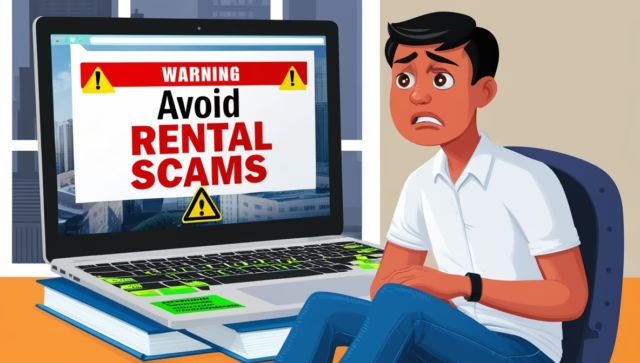Looking for student accommodation in a new city comes with risks. As the number of international students is rising, so are the chances of encountering rental scams. From fake listings on social media to shady landlords, scammers know exactly how to target students in a hurry. Whether you’re booking from abroad or already on the ground, a little awareness can save you from big losses. So, how do you stay one step ahead in 2025? Let’s walk you through it.
What Are Rental Scams and How Do They Target Students?
Rental Scams usually involve fake ads for student accommodation that either don’t exist or are already occupied. The scammer usually poses as a “landlord,”. They ask students for rent or a deposit in advance. And then they vanish, stealing the money. Most of the time, these scams occur on Facebook Marketplace, Gumtree, and WhatsApp groups. Their main targets are international students who are new to the city. Or students who are eager to find a house in the city.
What Are The Rental Red Flags You Should Never Ignore?
Some student housing listings might look perfect at first glance. But if in your gut, something feels off, then trust it. Scammers often use pressure tactics or emotional appeals to get you to act fast. Here are a few common warning signs to watch out for:
- Unrealistically cheap rent: If the price is way lower than similar student accommodation nearby, it’s probably a trap.
- No video calls or property viewings allowed: A legit landlord or agent won’t mind showing you the room virtually or in person.
- No contract or ID provided: If you’re not given a rental agreement or proof of who you’re dealing with, back out.
- Listing appears only on social media and has no real reviews: Scammers love using platforms like Facebook or Gumtree, where it’s easy to hide.
- Photos look real but seem reused: Do a reverse image search. Many scammers steal pictures from genuine student apartments.
How to Protect Yourself When Searching for Student Rooms?
Finding student accommodation abroad can leave you prone to scams if you’re not careful about it. Whether you’re booking from abroad or already in the city, staying alert and following a few smart steps can save you from a lot of stress later. Here is how you can protect yourself during a search:
- Use Verified Booking Platforms: Stick to trusted names like University Living or your university’s official site. They list verified student apartments with secure payment options.
- Insist on a Virtual or Physical Viewing: Always ask to see the student housing before booking. A video tour is the bare minimum. And if they say no, that is a red flag. And you need to walk away.
- Verify the Landlord or Agency: Ask for their ID or proof if they represent a real estate agency. Cross-check their name or company through official sites.
- Pay Through Secure Channels Only: Never send money via crypto or wire transfers. Use debit/credit cards or secure portals that offer buyer protection.
- Get Everything in Writing: If the room you have seen does exist, then it should come with a lease or contract. And that contract should clearly mention the rent amount, tenancy dates, and terms.
What to Do If You Think You’ve Been Scammed?
Realizing that you have been scammed while searching for student accommodation can be stressful. But if you act fast in this, it can make a big difference. Whether you’ve sent money or just have a bad feeling, don’t wait it out. The sooner you take action, the better your chances of recovering your losses and protecting others. Below are the things that you need to do once you realize that you have been scammed:
- Stop payments immediately and contact your bank. Ask them to block the transaction or reverse it if possible.
- Report the scam to UK Action Fraud. Or you can also go to your country’s local authorities. This will help start an investigation and may prevent future scams.
- Notify your university. They can help you find trusted student rooms and offer support.
- Warn others by flagging the ad or reporting the account. Alert the platform where you saw the listing. Help others, so that they don’t fall for it too.
- Save all of the screenshots, conversations, and receipts. Keep a record; this will be important if you file a report or dispute the charge.
Conclusion
Being smart about your student housing search isn’t about being paranoid. It is about being prepared. Scammers are getting advanced, and so are the tools to avoid them. Stay true to trusted platforms, ask the right questions, and never rush into payments. That too without verification. If something feels off, it probably is. Stay sharp, and you will remain scam-free.
Read More: Student Accommodation in London: A Checklist for First-Time Renters








[…] Read More: How to Avoid Rental Scams as a Student in 2025? […]